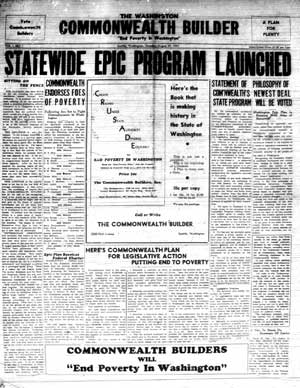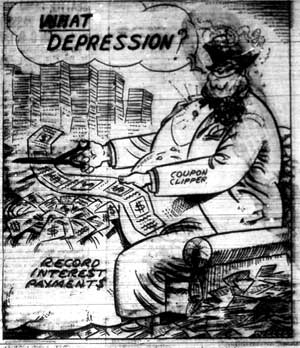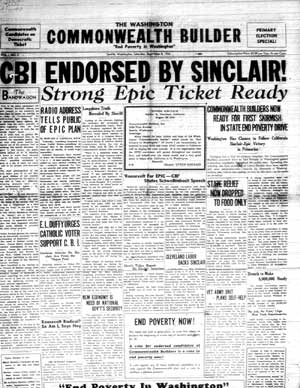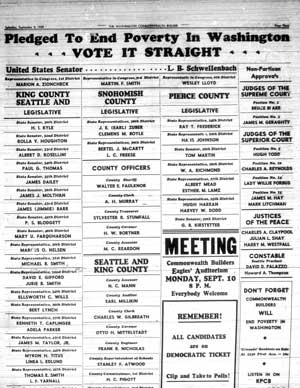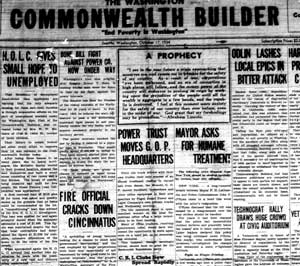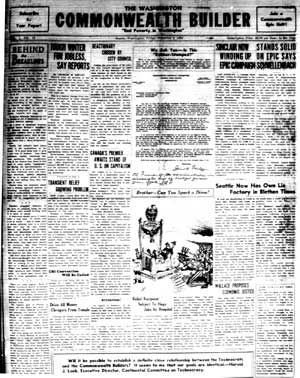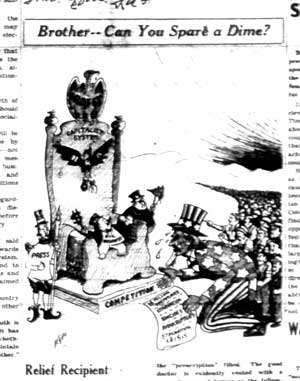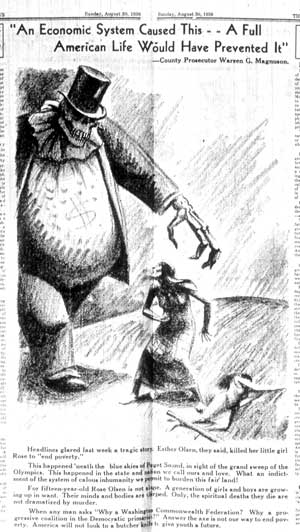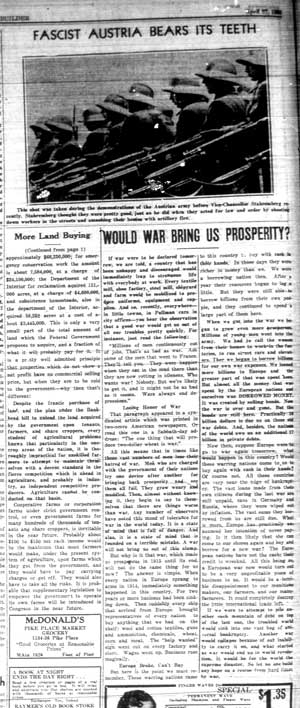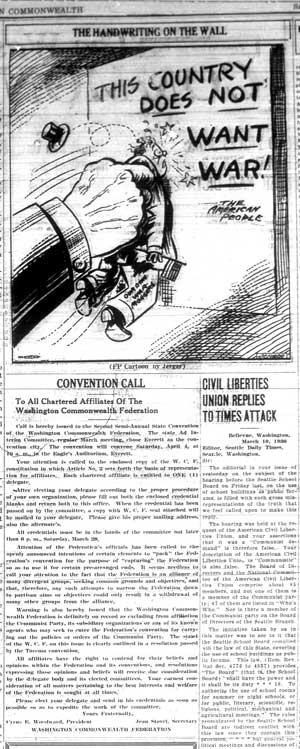Washington Commonwealth Builder/
Washington Commonwealth
Report by Jessica DunahooAbstract: The Washington Commonwealth Builder and the Washington Commonwealth were the first of a series of names given to a weekly paper issued by the Washington Commonwealth Federation, a leftwing group active in Washington State in the 1930s and 1940s. Employment, democracy, freedom of speech, and general social welfare were primary issues focused on by the paper. “Production for use” and not for profit was the rallying cry and a central theme repeated again and again throughout the paper’s formative years. Lineage: The Washington Commonwealth Federation played a key role in state politics from the mid 1930s through the end of the 1940s. A coalition of progressive organizations and individuals operating within the Democratic Party, the WCF nominated candidates for state and local offices and promoted ballot measures and other political initiatives. Many of its candidates were successful and at times the WCF exercised a great deal of influence in the state legislature and in Washington's Congressional delegation. The Washington Commonwealth Federation grew out of an earlier organization, the Washington Commonwealth Builders, Inc. that had formed during the 1934 election campaign. The organization changed its name in 1935. The newspaper went through six name changes:
Description: The Washington Commonwealth Builder was published in Seattle by the Commonwealth Builders, Inc. (CBI), a coalition of unemployed men and women. .Although intended to be a weekly paper, it was not published on the same day every week for the first year of its existence. For example, the first issue was published on Thursday, August 23, 1934; the second on the following Wednesday; and the third on the next Saturday. John Sheppard served as editor of the paper and H.J. Dunleavy was the business manager and later the assistant editor. The paper was printed by the Kimball Press, located at 2228 First Avenue in Seattle, Washington. Tag lines on the front page read “End Poverty in Washington” and “A Plan For Plenty.” Each issue contained four to six pages consisting primarily of articles, as well as advertisements and some political cartoons. Authors were rarely named. Ending Poverty One of the ongoing issues written about in the paper was Upton Sinclair’s California-based EPIC (End Poverty in California) program. The CBI believed EPIC offered an excellent model for social and economic reform and struggled to find political candidates to promote its expansion into Washington State. Under this plan, a state industrial commission would be created to launch state-owned farms and industries to employ those who could not secure employment in the private sector. Employees would produce goods to be sold in state-owned stores and the employees would in turn purchase these same goods. A separate form of currency would be used to pay employees and to purchase goods within the system to ensure the rate of return. Essentially, the people involved would produce goods for use and not for profit. [1]According to numerous articles in The Washington Commonwealth Builder, production for profit had been the downfall of the American economic system and the cause of the overwhelming unemployment, poverty, starvation, and desperation brought on by the Great Depression. In response to the widespread suffering of Americans, the paper encouraged readers to join the CBI’s “CRUSADE” (Create Riches Under State Authority Dividing Equitably) to end the capitalist system of production for profit. [2]To support its opposition to the profit system, the paper frequently referred to what it claimed was a conflict between capitalism and fundamental Christian principles. In its first issue, the paper stated that what “an enlightened conscience of a Christian should ask of a system is that it provides security for all people” and encouraged people to “challenge the whole ethical basis of the present capitalist system.” [3] In a later issue, the paper again attacked the lack of Christian principles within the capitalist system when it published a story about a young baby dying of malnutrition because his mother was unable to afford enough food to keep herself healthy and her breast milk nutritious. The story of this particular baby took place in Rhode Island, the state with the highest number of millionaires per square mile at that time. Adopting the baby’s perspective, the author writes, “You are neither Christian nor civilized for I came into your midst with the choicest gifts of heaven…and you let me starve…in the midst of untold wealth” [4].Politics Politically, The Washington Commonwealth Builder advocated active participation by all citizens. The pages of the paper were covered with advertisements for various politicians who had vowed to support the EPIC program to end poverty. In 1934, Upton Sinclair himself was campaigning for Governor of California on the EPIC platform. The newspaper mentioned Sinclair and his campaign in nearly every issue. Advertisements for Sinclair’s books could be found among the pages of articles written in agreement with his political philosophies. One article also noted that Sinclair’s campaign to abolish poverty had spurred a massive migration of people to California. [5]The paper also followed the presidency of Franklin Delano Roosevelt and the politics of the New Deal quite closely. Initially, The Washington Commonwealth Builder supported the New Deal and believed that it would bring prosperity and relief to the millions of suffering Americans. However, over time the CBI became more critical. For instance, on December 22, 1934, the paper questioned if the New Deal was really set up to benefit corporations, as the published increase in profits was 175 percent, “twice that of 1932.” It also criticized the low wages of people employed by the government under the New Deal, arguing that low government wages enabled the private sector to lower wages fifteen percent due to a lack of competition for jobs. [6] By early 1935, the newspaper was arguing that “Roosevelt’s promises have failed;” unemployment was still increasing and bankers appeared to control the government.[7]Despite its criticism of the New Deal, the newspaper remained aligned with Democrats in opposition to the Republican Party. It called attention to and openly criticized various Republican acts that violated human rights, such as lobbying to remove suffrage rights from the unemployed who were receiving aid. The newspaper declared that rescinding voting rights from such a massive portion of the population would only increase the disparity between rich and poor and end democracy as the country knew it. The Washington Commonwealth Builder denounced the Republican Party for its mudslinging campaign efforts, observing that such tactics deviated from the real issues at hand. [8] In the same issue, the paper pointed out that Republicans had called the relief efforts by the Democratic Party unconstitutional, and that the Republican Party was the same party that proposed higher rates in existing taxes and the imposition of new taxes on items such as food, which many people could already barely afford.The newspaper repeatedly pointed out the great disparity in wealth among American citizens, noting that five percent of the population controlled ninety percent of the nation’s financial resources. “[E]nlightened Liberalism knows that the so-called wealth in the hands of rich persons and great corporations is not wealth at all, but only debt claims against the masses,” one article stated. [9] For the CBI and its newspaper, then, capitalism had initiated class warfare, the rich manipulating and controlling the poor while the poor struggled to maintain their constitutional rights.Denouncing the Rich The Washington Commonwealth Builder frequently cited two men, Henry Ford and William Randolph Hearst, as examples of the evils of capitalist exploitation. The paper brought notice to Henry Ford’s so-called charitable actions that in reality only saved him hundreds of thousands of dollars. For example, when Ford conspicuously advertised his hire of 4,000 welfare workers, the paper pointed out that in fact Ford had first laid off 4,000 workers whom had been employed for some time and were making six dollars a day and replaced them with the welfare workers whom he now paid only four dollars a day. [10] It also called attention to Ford’s anti-union stance and criticized what it considered Ford’s extreme capitalist greed in taking advantage of thousands of employees.As owner of several of the daily public presses, William Randolph Hearst was in control of much of the mass media of the time. The editors and publishers of the Washington Commonwealth Builder often referred to the Hearst media as a “kept press.” They saw themselves in a better position since they were unhampered by large advertisers and dedicated to printing the truth as opposed to Hearst papers like the Seattle Post-Intelligencer, which they often accused of distorting the truth. [11] For instance, with anti-communism on the rise in late 1934, Hearst began sending out reporters to various professors and politicians to ask incriminating questions in hopes of outing those with communist affiliations. The Washington Commonwealth Builder discovered this and printed an article informing its readers of the events and calling Hearst, not the “Reds,” the “U.S. menace.”[12] Hearst’s newspapers were also accused of publishing anti-Semitic information and appearing to support Adolph Hitler.Talk of War The Washington Commonwealth also took a decided stand against militarization and the prospect of a second World War. The paper worried that the American public had begun to wonder if a wartime economy was the answer to the idleness of unemployment and the desperation of poverty. In October 1935, amid news of Hitler preparing Germany for war by increasing military spending, the paper uncovered that the United States had increased its own military spending by 190 percent. Following this news, the paper began publishing descriptions of the extreme violence and countless deaths that would occur if the country went to war. [13] The paper reminded readers that there were other alternatives for ending the Depression without resorting to war to boost the economy.Technocracy Many of the politicians supported by the paper aligned themselves with a newly formed political group, the Technocrats. Often campaigning as Democrats, Technocrats proposed placing the means of production in the hands of engineers and scientists, individuals whom they believed were best equipped to manage the economy. They were opponents of the right of a few choice men to own and control all sources and facilities of production. The Technocrats feared that this system made “virtual slaves of the rest of mankind.” An unequal distribution of wealth denied the fact that the earth belonged to everyone. Technocrats pointed out that capitalism offered no relief for the poor and rebuffed capitalists’ hostility toward old age pension plans, child labor laws, and any form of health insurance or even sick time. [14] The Washington Commonwealth also took notice of Technocratic governments outside of the United States. On December 12, 1935, it ran an article describing technocracy at work in Norway. The paper informed readers that the Norwegian government had taken control of and begun to regulate farm products such as corn, milk, meats, and flour so that they would be more widely available to all citizens. In the process, Norway was also working to increase the buying power of its less fortunate citizens, realizing that those who could not afford could also not consume. The newspaper recommended that the United States and Washington State view Norway as a model for an effective economic system that would leave no family hungry.[15]Health Issues During these years, hunger was an immense problem faced by millions of Americans. The Washington Commonwealth Builder published several articles on the food shortage, including one accusing government relief administrators of allowing hundreds of pounds of food to rot while the hungry were turned away because “they could not prove that they were hungry enough.” [16] The paper also opposed a city food tax that had been proposed just weeks before. In addition, it informed readers of the minimum daily requirements of milk, fruits, vegetables, breads, fats, sugars, and meats for a family of five in order to avoid malnutrition, encouraging them to stay as healthy as possible. Tuberculosis was a widespread health problem as well. The paper published articles publicizing its spread through the poorest segments of the population and advocated the promotion of anti-TB seals to fund healthcare for those affected. The newspaper also discussed the socialized healthcare system that was then being considered in Canada and the potential benefits that it would bring to the people there.[17]Advertisements Along with these social and political issues, The Washington Commonwealth Builder advocated support for local businesses and cooperatives. The advertisements within its pages included local barbers, shoe repair shops, grocers, dentists, and even life insurance policies. The paper ridiculed ads in other newspapers that depicted beautiful women purchasing fine goods, noting that these upper-class women spent more on clothing and rent than most people made in a year and did not represent the “typical consumer.” [18] It also advertised local dances and theatre productions as well as radio stations that broadcast speeches given by progressive politicians and allies. When the small town of Kirkland established its own Commonwealth Club, this news was also published in the paper.In its earliest issues, the paper even advertised itself, boasting that it was “the sword available to any who desire to battle on behalf of their own right to live as men and women, sharing in the wealth, not the hand outs of a wealthy state.” [19] At two dollars a year for a subscription, or five cents a copy, the paper was an affordable way for the public to keep informed and well armed against capitalism and greed. It recognized that the rampant unemployment and increasing number of people on relief was not due to choice or laziness but to the failure of a system that should have been able to provide for all of its citizens.Cartoons Alongside the advertisements and articles were political cartoons satirizing the plights faced by millions of Americans during the 1930s. Many of the first cartoons featured fat men with bags of money seated on the throne of capitalism while Uncle Sam and a line of millions of people begged for relief, jobs, and food. Another cartoon depicted a greedy employer pick- pocketing the working class as politicians asked the looter for campaign funds. Still another cartoon showed a hefty white woman telling a Native American Indian, “If you don’t like this country you should go back where you came from.” [20] Politically charged cartoons such as these reinforced the message expressed in other areas of the newspaper regarding the hypocrisy of the American political economy.Overall, the series of newspapers published by the Commonwealth Builders, Inc. and the Washington Commonwealth Federation from 1934-1936 were strong advocates of socialist views such as equality for all and ending poverty and hunger. The papers promoted the civil liberties granted to all citizens under the constitution and ridiculed the “impossibility of the American Dream.” [21] From EPIC and the CRUSADE to their strong advocacy of mass political participation and their stories uncovering the corruption of capitalism, The Washington Commonwealth Builder and its successors were an important voice for left-wing politics in the State of Washington and an integral part of the history of the Great Depression in the Pacific Northwest.[1] “Here’s Commwealth Plan For Legislative Action Putting End to Poverty”, The Washington Commonwealth Builder, August 23, 1934, page 1. [2] Advertisement for a pamphlet on the CRUSADE, The Washington Commonwealth Builder, August 23, 1934, page 1. [3] Quote from Reverend Cameron Parker Hall reprinted in “Church Challenges Individualism with Christian Ethics”, The Washington Commonwealth Builder, August 23, 1934, page 3. [4] Oscar Ameringer, “In God’s Country a Baby Starves”, The Washington Commonwealth Builder, September 8, 1934, page 2. [5] The Washington Commonwealth Builder, September 18, 1934. [6] “House Votes Down Fair Wage Provision in Approving Relief”, The Washington Commonwealth Builder, February 2, 1935, page 1. [7] “Roosevelt Promises Fail to Bring Hope of New Standards”, The Washington Commonwealth Builder, February 16, 1935, page 1. [8] “California Mudslinging Now In Order”, The Washington Commonwealth Builder, October 24, 1934, page 5. [9] “The Bandwagon”, The Washington Commonwealth Builder, August 29, 1934, page 1. [10] “Ford’s ‘Charity’ Pays and Pays” The Washington Commonwealth, January 18, 1936, page 4. [11] The Washington Commonwealth Builder, September 8, 1934. [12] “Hearst-Not Reds-is U.S. Menace”, The Washington Commonwealth Builder, January 12, 1935, page 1. [13] “War! What For”, The Washington Commonwealth Builder, October 12, 1935. [14] Charles A. Reynolds, “Technocracy”, The Washington Commonwealth Builder, October 3, 1934, page 3. [15] “A Study of New Norway Economy Now In Action”, The Washington Commonwealth, December 21, 1935, page 1. [16] “No Hungry People So Food Store Rots”, The Washington Commonwealth Builder, November 16, 1934, page 1. [17] “State Health Insurance in Canada Asked”, The Washington Commonwealth Builder, November 16, 1934, page 1. [18] “Typical Consumer”, The Washington Commonwealth Builder, April 27, 1935, page 4. [19] Advertisement-“Wanted: An Army”, The Washington Commonwealth Builder, August 29, 1934, page 4. [20] Cartoon, The Commonwealth News, June 6, 1936. [21] The Washington Commonwealth Builder, August 23, 1934. |
Click to enlarge
1934 Election As the election neared, CBI pushed its slate of candidates in the Democratic primary, all of whom had endorsed the End Poverty program. A number of candidates went on to win the primary and general elections, including new U.S. Senator Lewis Schwellenbach and Congressman Marion Zioncheck. (September 8, 1934)
Cartoons Against Militarism
|
|
Copyright (c) 2006 by Jessica Donahoo |
|

